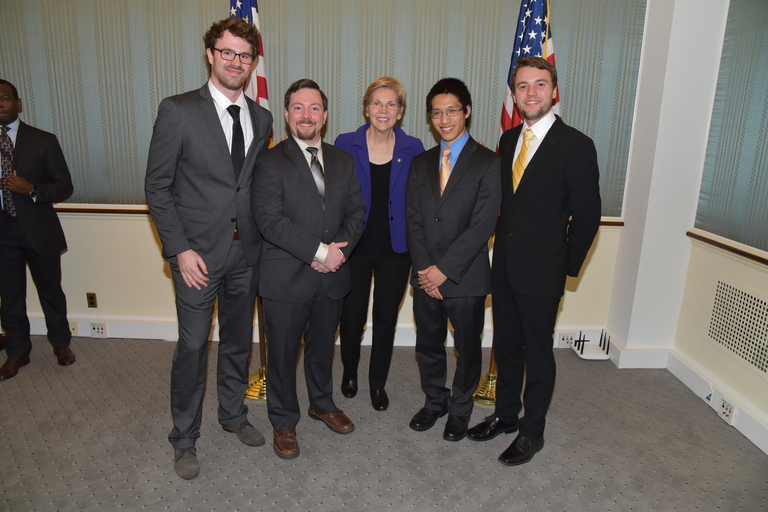5 July 2016
Advocacy for science and scientists alike
Posted by Shane Hanlon
This is a guest post by graduate student Michael McClellan as part of our ongoing series of posts where we ask students to share their experiences in science communication.
It was 8:25 AM, and I was already two strong cups of coffee into my day. Was that why I was jittery? I have given presentations of my own scientific work to small and large audiences—so what made this meeting any different? Perhaps it was the feeling that I was coming hat-in-hand to ask for direct action on my behalf with nothing to give in exchange. After shaking hands and exchanging business cards, I forcefully swallowed in a vain attempt to get my heart out of my throat. With just enough courage to get by, I began by looking directly into the Congressional staff member’s eyes, saying, “I would like to thank you for meeting with me today to talk about issues facing graduate students at MIT and across the entire country.”

MIT Graduate Student Council members meeting with Senator Elizabeth Warren (D-MA). Left to right: Daniel Franke, Daniel Curtis, Sen. Warren, Peter Su, Michael McClellan
I eventually got into a good rhythm, as I would end up meeting with twenty more Congressional offices as part of the two-day Legislative Action Days event organized by the National Association of Graduate-Professional Students. Each school’s delegation was responsible for setting up their meetings and determining the content of their discussions with Members of Congress or their appropriate staff members. The four of us representing the MIT Graduate Student Council (GSC) discussed science funding, domestic renewal of F-class student visas, and potential creation of a class of visas for entrepreneurs creating start-up companies. We had conducted extensive research, we created produced polished “leave-behinds” with key information, and our distributed expertise led to—with the exception of our nervous first meeting—a natural conversational flow with every office we met.
As President of the MIT GSC, I understood my duty to represent the interests of MIT graduate students; however, even during my last meeting of the two-day series, I couldn’t shake my discomfort with asking congressional staff members to direct funding and personnel to projects that would directly benefit me. It is this personal connection, though, that might be a great advantage in communicating my position. If, as Rep. Tip O’Neill told us, all politics is local, then I have a logical extension gained through empirical observation: effective politicking is personal.
The best conversations I had about stabilizing NASA funding started with me discussing how profoundly my life has changed by my current research opportunity at MIT. Despite differences in political views, no member of Congress could deny the effect ample NASA funding had on my future and the future of Earth science research. If you are doing research but you have similar trepidation about feeling like a useless “lobbyist” on Capitol Hill, I encourage you to think about how you could frame an important message that is both personal and informed by your unique scientific training. In my experience, these personal-professional messages can be incredibly effective. If you are at all interested in a career in policy, find a group where you can work with experienced peers. An unscheduled drop-in congressional visit could be the first step toward getting a high-impact job in Washington!
-Michael McClellan is a third-year PhD Student in Atmospheric Science at MIT, was previously the President of the MIT Graduate Student Council, and is interested in air pollution, scientific drawing, and baseball.










 The Plainspoken Scientist is the science communication blog of AGU’s Sharing Science program. With this blog, we wish to showcase creative and effective science communication via multiple mediums and modes.
The Plainspoken Scientist is the science communication blog of AGU’s Sharing Science program. With this blog, we wish to showcase creative and effective science communication via multiple mediums and modes.